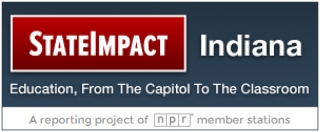Schools in the five counties chosen to participate in Indiana’s pre-k pilot program plan to have it up and running for the 2015-16 school year. That means they have exactly 12 months to prepare and already the timer seems to be ticking rather quickly.
Emerson Elementary School in Seymour is playing host this summer to a kindergarten program called Jump Start – as well as a group of participating 5-year-olds like Zoe who is eager to talk about what she’s doing here.
"It’s like getting ready for kindergarten," she said. "My teacher told me we were going to do a lot of stuff."
For Zoe, and many other 4- and 5-year-olds in Jackson County, programs like Jump Start have always been their first introduction to school, until now.
Starting in July of 2015, Jackson and the four other counties selected for the state’s pre-k pilot program will distribute vouchers to eligible families, who can use them to enroll their kids in preschools
"There’s a push to really see if we can move that needle up. I think everybody understands why it’s important, it’s just the logistics of getting it done," said Dan Hodge, executive director of the Jackson County Education Coalition, a partnership of community leaders formed to organize local education programming.
He says one of the first things his county will have to do to rev up for the pilot is figure out who will provide pre-k services. Eligible kids can’t just go to any preschool. It has to qualify as a Level 3 or 4 –the top two levels – on the state’s rating system. Counties may have to work to bring existing providers up to those standards.
Currently, only 48 low-income kids receive services in Jackson from three eligible providers.
If all goes according to plan, the families of about 200 more kids will be able to choose from 12 qualified providers next summer.
To qualify, a student’s family can earn no more than 127 percent of the federal poverty limit. That’s a little more than $28,000 for a family of four.
Finding and informing eligible kids and their parents is item No. 2 on the counties’ to-do lists.
"It’s a huge piece or marketing. How do you reach the folks that are not currently being served? Just like anything with marketing, you keep beating the drum," Hodge said. "We’re at the fair. We’ve been to the different offices. We’ve been to the shelter house. You keep showing the importance of it, not just once, not just twice, but over and over again."
Also on the list: securing private donations, mapping out a parent engagement component and setting benchmarks for academic growth. But some of this will have to wait, until more specific direction comes down from the state’s Family and Social Services Administration.
"The state…they’re fine-tuning the rest of the story. The questions that I’ve had, most of the time the answer is, ‘we don’t know yet. We’re waiting for more information, but we’re moving forward.’ As that information is released it will help our community address that," said Janice Read, executive director of the Child Care Network, a partner in Jackson County’s efforts.
In the end, leaders, teachers and families alike are grateful for the opportunity to be part of the pilot program, and ultimately help improve the way their county operates.
"Pre-k, that’s the good beginning. Then that helps facilitate the better success at our middle school/high school, which make better the college students, that make better the employees," Read said. "We want our state to succeed."
Before the pilot was initiated, Indiana was one of 11 states that did not offer any publically funded preschool. Now, state officials plan to see how well the pre-k program works in the initial five counties before deciding whether to expand it statewide.
 DONATE
DONATE







 View More Articles
View More Articles



 Support WFYI. We can't do it without you.
Support WFYI. We can't do it without you.